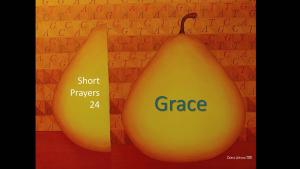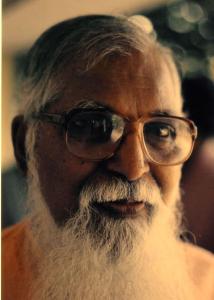
Short Prayers? Really? Even when we thank God for grace?
God proves his love for us in that while we still were sinners Christ died for us. (Romans 5:8)
Swami G again, now on Judgment
When Guru Nitya Chaitanya Yati–Swami G–had finished talking about the cat killing the mouse, Swami G told a parable. I was amused to listen to this parable, because it followed the form of the oneiric judgment scene. This form of “last night I dreamt I had died and stood before St. Peter at the pearly gates” is the framework for so many jokes in the Western world. Now I find it in India coming from the mouth of a Hindu philosopher. “Could the notion of a last judgment indicate a universal human sensibility?” I asked myself.
 In the guru’s parable a holy man, a sanyasin or saint, dreamt he had died. As his soul was wending its way above the treetops toward the clouds, he noticed the soul of the town roustabout. This other soul too was making its way up toward heaven. The rogue, who was notorious for his self-indulgence and debauchery, must have died about the same time. Each was curious about the other. “How come I’m going the same direction the sinner is going?” the saint asked himself. And similarly the sinner, “How come our souls are both ascending?”
In the guru’s parable a holy man, a sanyasin or saint, dreamt he had died. As his soul was wending its way above the treetops toward the clouds, he noticed the soul of the town roustabout. This other soul too was making its way up toward heaven. The rogue, who was notorious for his self-indulgence and debauchery, must have died about the same time. Each was curious about the other. “How come I’m going the same direction the sinner is going?” the saint asked himself. And similarly the sinner, “How come our souls are both ascending?”
Upon arrival at the gates of heaven both saint and sinner found themselves at the desk of a celestial secretary. “We want to see our ledgers recording our good and evil deeds in the book of life,” the two new arrivals requested. “We think there’s been some mistake,” the rogue went on; “he’s a good man and I have done nothing but evil in my life. We should not have ended up at the same place.”
“Well, if you must look!” the secretary responded as if bothered. After locating the book and placing it on the desk, he searched for their respective names. Each had his own page and, by coincidence, the two pages faced one another. “Let us see what’s on them,” the two pressed. After the book was turned around so they could see, they exclaimed, “Why, these pages are blank! There’s nothing written here!”
“Well, what did you expect?” asked the secretary. “Do you think all God has to do is sit around and pay attention to what you’ve been up to in your lives? What you have done or not done on earth is behind you now. Forget it.”
Is there room for God’s grace?
The point the swami was making here is the same point as the cat story. But there is an added touch of grace here. The sinner’s sins did not follow him to heaven. Like Jesus’ prodigal son in Luke 15, the rogue was receiving a reward he did not deserve. The difference is that, for Jesus, the reward is due to the love of the heavenly Father; whereas, for the Hindu teacher, it is due to a sort of cosmic neglect. The saint, who would correspond to the prodigal’s older brother, seems to be more curious than jealous. The swami and I along with others in the session talked about these things.
I wonder how the guru’s story might be told with a Christian interpretation. I suspect the difference would be this: when the saint and sinner looked at their respective pages in the book of life they could not read what was written on them. The reason is this: the pages had been so smeared with blood that they were illegible.
PRAYER
God of grace, we thank you for the forgiveness of our sins and the promise of eternal life with you. Amen.
▓
 Ted Peters is a Lutheran pastor and emeritus seminary professor. He is author of Short Prayers and The Cosmic Self. His one volume systematic theology is now in its 3rd edition, God—The World’s Future (Fortress 2015). He has undertaken a thorough examination of the sin-and-grace dialectic in two works, Sin: Radical Evil in Soul and Society (Eerdmans 1994) and Sin Boldly! (Fortress 2015). Watch for his forthcoming, The Voice of Public Christian Theology (ATF 2022). See his website: TedsTimelyTake.com.
Ted Peters is a Lutheran pastor and emeritus seminary professor. He is author of Short Prayers and The Cosmic Self. His one volume systematic theology is now in its 3rd edition, God—The World’s Future (Fortress 2015). He has undertaken a thorough examination of the sin-and-grace dialectic in two works, Sin: Radical Evil in Soul and Society (Eerdmans 1994) and Sin Boldly! (Fortress 2015). Watch for his forthcoming, The Voice of Public Christian Theology (ATF 2022). See his website: TedsTimelyTake.com.
▓













